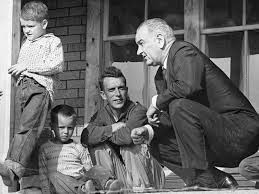Now, it is a simple thing to declare this something of a success with the perennial qualification of "but there is still much work to be done". At the same time, those on the other side of the political spectrum can just as easily claim it to be a Pyrrhic victory because, for all the financial, political and emotional resources that have been expended in this "war", a 4 percent decrease is indicative of a waste of time.
It has already been shown from all that has gone before that neither side will win an argument as to the validity or even the existence of victory in the eyes of the other. However, this has as much to do with how the problem of poverty has been framed and it's supposed solutions derived as it does with partisan opinions.
Poverty is and has always been a serious problem and a stain on the honor and conduct of any nation that has willfully allowed practices that dispose people to it. Although it is also true that poverty in much of the rest of the world is relatively and actually far worse, it is none the less the case that to the degree to which it exists here, it is unacceptable. These are high ideals and high ideals are required if a society wishes to aspire to something greater than it is now. However, as always, what goes unseen is more important than what lies on the surface.
Poverty, and the so called war on it has become nothing more than a convenient rallying point for differing political positions to gain legitimacy by seeming to do something without doing anything at all. This is not an indictment of any politician or political position in specific, but simply a description of what has been the case as long as people have appealed to mass society in order to gain favor. A four percent decrease over 50 years is not indicative of a dysfunctional government hampered by partisanship, but rather that the programs in place have maintained the status quo at best and kept people in poverty at worst.
It is far easier to appear to be doing something when the measures of success are unclear or non-existent than it is to actually do something meaningful that lasts. As has been said before though, even those with the best intentions in the current system are and will be restricted by the nature of the system itself. In a world of finite resources in which a zero sum game is the regime, zero will always be the sum. No amount of policy and legislation will solve something as deep as human suffering. Thus it is better to stop waiting for such to come about and campaigning for it as if it were a life and death struggle. It is better to actually act on supposed personal ideals and do something.
Doing something does not require quitting your day job. It does not so much even require going out of one's way. What it does require is putting words to action. The poor are closer than you think. Many of us avoid their neighborhoods on our way home every day. Many of us ignore them when we pass them on the street corner. Many of us claim we are too busy to pay attention, or too broke to contribute to legitimate organizations dedicated to providing for those in need.
Until we start fighting the war on poverty one individual at a time, why should we expect something as systematic and machine like as the government to do a human's job? Some may complain about freedoms being limited. The freedom to have compassion is not, and it benefits all who take advantage of it.
 |
| LBJ did because he experienced it first hand |


No comments:
Post a Comment